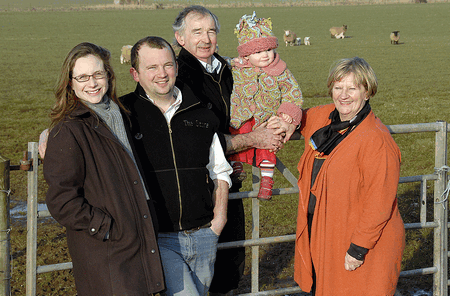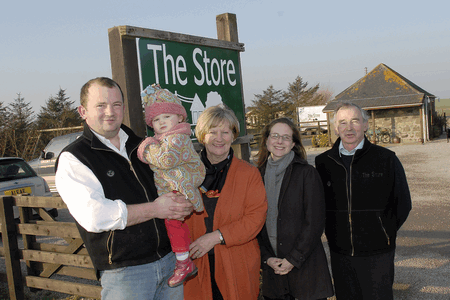Farming and retailing success

The banter between – and keen sense of fun shared by – the members of the Booth family are key to their successful dynamic as a team totally committed to growing their food retailing and farming business.
George and Pat Booth and their son and daughter-in-law, Andrew and Debbie, farm 750 acres near Ellon in Aberdeenshire. In the past eight years they have also built up The Store from a humble farm shop in a converted bothy to a brand with real clout, with a shop in Edinburgh and product lines in Waitrose.
The daily running of the business sees the four spend much time together – from manning the farm shop and farmers’ market stalls to grafting behind the scenes in the butchery, kitchen and office.
The business is thriving but, inevitably, there are challenging times. While tensions do rise when the going gets tough, any flare-ups are soon forgotten and each family member is brimming with humorous work-related anecdotes to tell about the others.
The Booths have traced their farming roots in Aberdeenshire back to 1630 and George’s father was a tenant farmer and auctioneer with Aberdeen and Northern Marts.

The family bought their first farm in 1962 when they moved to the 400-acre Savock, which was in a very run-down state.
“We farmed it very traditionally, fattening cattle and growing grain and in 1979 bought neighbouring Ardgill, then Andrew bought Westfield in April 1999,” says George. The family also contract-farms 300 acres, doing mainly stubble-to-stubble work.
The family currently runs 250 Scotch Mule ewes, producing Texel-cross lambs. They also fatten around 400 Aberdeen Angus cattle, the majority of which are bought privately. The Booths source store cattle from Dingwall Market and the auction ring at Thainstone, Inverurie.
Their grade 3:2 land is on the heavy side and more suited to winter cropping than spring. Last year winter barley yielded around 3.3t/acre, with the winter wheat at 3.5t/acre.
Most of the grain is sold ex-farm, with only a small amount retained for the cattle, which are largely over-wintered on grass silage. “We also sell propcorn straight into the feed market. With the price of fuel, avoiding drying costs makes a lot of sense,” says Andrew.
Prior to starting up The Store in 2000, the family was fattening around 600 cattle, but poor prices were getting them down, in particular George who spent two or three days each week at the ringside buying stores.
All four have a passion for good food, but there were some reservations expressed when Andrew originally suggested setting up a farm shop in an old bothy at Westfield, where he and Debbie live with two-year-old daughter, Florrie. The idea was initially met with a chorus of “that’ll never work”, but a year later it became a reality.

The road to getting the project off the ground was far from smooth and the family spent a lot of time knocking unsuccessfully on the doors of officialdom looking for support.
“It was hopeless!” says Pat. “But the more doors we knocked on only to be turned away, the more determined we became to make a go of it ourselves. Initially there was no grant aid. We were told we were too near Aberdeen and would cause displacement to local business and ‘You are a farmer, you already get subsidies’.”
“Diversification” is a word which Andrew shakes his head at. “What we have is another enterprise within our farming business specialising in adding value to our farm product through a retail market. It’s no different from someone producing pedigree tups or bulls and specialising in their farming environment,” says Andrew.
Set-up for a start was in the region of £15,000 to convert the bothy.
While the Booths have found some levy-funded organisations have offered little support, they have found assistance from the Grampian Food Forum invaluable.
The same month as they opened in July 2000, Aberdeen Farmers’ Market started up. “To be honest, when we started with the farmers’ markets I thought, ‘We won’t be doing this in five years’ time’.
“For a start it was purely a way to market ourselves and sell The Store brand as opposed to making a profit, but after the first year we thought, ‘This has to start paying for itself’. Now we do four markets a month and it is still a great place to go to let people know about you, although it now only accounts for 10% of our turnover,” says Andrew.
Providing excellent customer service is seen as vital to the success of the business, but some customers are more challenging than others.
After proudly giving one new gentleman customer the full “spiel” about how the meat was all produced on the farm, he informed the family he was vegetarian.
“Undaunted, Mum described the wonderful range of home-made vegetarian quiches we have on sale only to be told by the customer ‘Real men don’t eat quiche’. Quick as a flash Mum retorted ‘Real men eat beef’. Needless to say we didn’t see that customer again!” says Andrew.
The women in the family play key roles, though neither is from a farming background. Pat was a nurse who met George at a Young Farmers’ dance and Debbie was a tax accountant who met Andrew in one of Aberdeen’s legendary student watering holes, The Bobbin. Pat loves cooking and rules the roost in The Store kitchen and Debbie looks after the accounts and record-keeping.
Andrew’s strength is his entrepreneurial business flare and George’s role is less defined but, supported by farm employee Brian Birnie, he is still very much involved in farming.
“We sat down one day and wrote down everyone’s names, with the main roles and responsibilities of each beside them. Whether he was responsible or took over responsibility for it, Dad ticked every box there was – we don’t know when he sleeps!” says Andrew.
One great strength is the family’s energy and willingness to “muck in”.
“The great thing is we all have many skills because of the way the business has grown. First we had a contract butcher, then we rented a butcher’s shop and as a family Mum, Dad, Debbie and myself were out there two or three times a week learning the butchery trade.
“On the kitchen side, Mum and Dad have a passion for food and great knowledge and skill. Debbie is the unsung hero who looks after the accountancy side of things, which is becoming a bigger job as we grow and take on more staff,” says Andrew.
Debbie’s parents, Bill and Kate, have moved up from Fife to Aberdeenshire and also play a part in the farm business. “Dad is always here at weekends doing something. He fixes things before we know they are broken and he’s brilliant with the public at farmers markets too,” says Debbie.
Debbie and her artistic mum set up the Pottery Barn in 2002 in a shed beside the farm shop. This added attraction caters for everything from hen nights to corporate days out. Visitors, explains Debbie, select a piece of pottery to hand-paint before it is glazed and fired in the kiln for them to take home.
George has established a number of “rules of engagement” which have played a key part in the successful foundation and growth of The Store side of business.
“When we started, lots of my friends in the meat trade said ‘You’re mad – you’ll sell the quality cuts but not the cheaper cuts’. But from the outset we operated with the ethos we had to use the whole carcass and ready-made meals were a major factor in that,” says George.
For the first year The Store farm shop was open seven days a week and either Andrew, Pat or George manned the shop. “From day one we had a stipulation that a member of the family would be there to meet people. We opened from 1pm-7pm, so we were shepherds in the morning and shopkeepers in the afternoon,” says George.
A crunch time for the fledgling food retailing business came when the local hotel, which had produced their ready meals, was taken over by a major chain. The family had a choice – they either invested in a big way or pulled out altogether. They decided to bite the bullet and, with the help of a £70,000 processing and marketing grant, they built the £150,000 butchery in 2002.
“Just two years into a very young business that was a huge amount of money to shell out but it was born out of necessity – we either invested or we had to stop,” says Andrew.
Another brave step was taken in 2005 when the family decided to take The Store “closer to the chimney pots” and opened a farm shop in Stockbridge, Edinburgh.
Andrew’s sister, Susan, runs this end of the business and the family now also supply two of Waitrose’s Edinburgh stores with six product lines.
They employ 24 full-time and part-time staff between their Aberdeenshire and Edinburgh operations. The bureaucracy which goes with staff and running a food business is something the whole family finds exasperating at times. “It’s no good ticking all the boxes if the tills aren’t ringing,” says George.
One area they all agree they could improve on is work/life balance and, while they usually eat together two or three times a week, they are determined to make more time to formally discuss the business so meal times are less about business chat and more about family banter.


